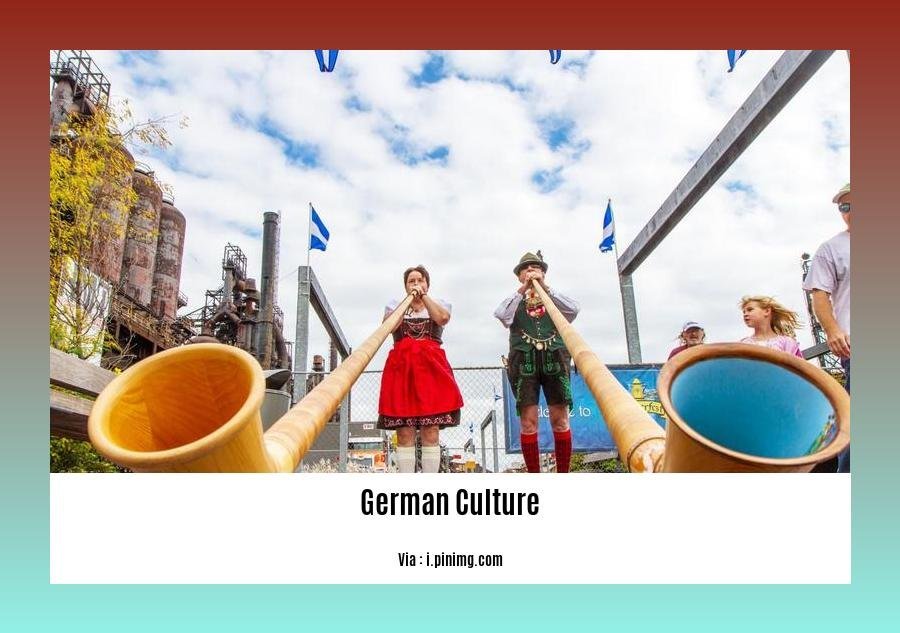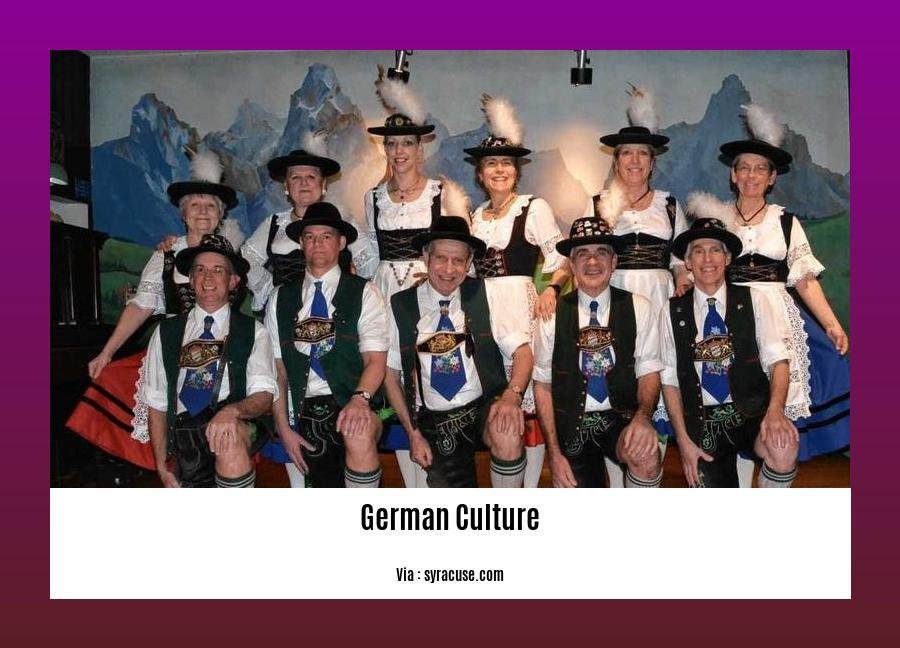Prepare to be amazed as we unveil 30 intriguing facts about German culture that will leave you astounded. From their unwavering dedication to recycling and rule-following to their unparalleled focus on efficiency and productivity, Germans have a unique way of life that sets them apart. Punctuality is not just a suggestion in Germany; it’s a high priority that governs their daily lives. Dive into this captivating exploration of German culture and discover the fascinating nuances that make this nation truly exceptional.
Key Takeaways:
Religion: A majority of Germans (65-70%) are Christians, with an almost equal distribution between Catholics and Protestants.
Language: German is the official language, spoken by approximately 95% of the population.
Clothing: Modern German attire often consists of dark, simple suits and shirts in formal settings, while traditional regional costumes also exist.
Philosophy: Germany is renowned for its rich philosophical history, with notable thinkers like Immanuel Kant, Schopenhauer, and Nietzsche.
Symbolism: German symbols include the coat of arms, featuring a black eagle with red beak and claws, and the flag, which has undergone changes throughout history.
Facts about German culture

Germany is renowned for its rich history, cultural diversity, and fascinating traditions. Let’s delve into 30 surprising facts that shed light on the unique aspects of German culture:
Religion
- Christian Faith: Approximately 65-70% of Germans identify as Christian, with nearly equal proportions of Catholics and Protestants.
- Diversity of Beliefs: Germany is home to a diverse religious landscape, with about 35% of the population belonging to various religious groups or identifying as non-religious.
Language
- German Dominance: German is the official language of Germany, spoken by a vast majority of the population (about 95%).
- Dialect Variations: While Standard German is widely understood, regional dialects and accents add richness and diversity to the linguistic landscape of Germany.
Attire
- Formal Dress: In professional settings, Germans often opt for dark, simple suits and shirts, reflecting a culture that values formality and sophistication.
- Traditional Costumes: Each region of Germany boasts its own traditional costumes, often worn during festivals and celebrations, showcasing the country’s cultural heritage.
Philosophy
- Intellectual Legacy: Germany has a rich philosophical tradition, with renowned thinkers like Immanuel Kant, Schopenhauer, and Nietzsche shaping the development of Western philosophy.
- Existential Themes: German philosophy often delves into profound questions about existence, morality, and the human condition, reflecting a deep intellectual curiosity.
Symbols and Icons
- Coat of Arms: The German coat of arms features a striking black eagle with red beak and claws, symbolizing strength, power, and national identity.
- Evolving Flag: The German flag has undergone several iterations throughout history, reflecting the country’s changing political and cultural landscape.
Additional Cultural Facts
- Punctuality: Germans place a high value on punctuality, considering it a sign of respect and reliability.
- Bread Culture: Germany boasts a diverse array of breads, with over 300 varieties, reflecting the country’s love for this staple food.
- Beer and Festivals: Germany is famous for its beer brewing tradition and its numerous festivals, including the world-renowned Oktoberfest.
- Environmental Consciousness: Germans are known for their commitment to environmental protection and sustainability, with a focus on renewable energy and recycling.
- Classical Music Heritage: Germany has a long and distinguished history in classical music, with renowned composers like Bach, Beethoven, and Mozart leaving an indelible mark on the world.
These facts provide a glimpse into the multifaceted tapestry of German culture, showcasing the country’s rich traditions, philosophical depth, and unique contributions to various fields.
Do you want to discover the secrets of delectable Greek cuisine? Indulge in the exquisite flavors of Greece food and explore the cultural heritage that goes into every bite. Take a culinary journey to the heart of Greece and experience the authentic taste of the Mediterranean. Facts about Greece food
Are you curious about the history, culture, and landmarks of Islamabad? Dive into the fascinating world of Pakistan’s capital city and uncover its hidden gems. From awe-inspiring monuments to serene landscapes, Islamabad offers a blend of modernity and tradition. Embrace the vibrant spirit of this city and learn more about its unique identity. Facts about Islamabad
Get ready to embark on a culinary adventure in the heart of Kenya! Explore the diverse flavors and traditions that make Kenya food a unique and tantalizing experience. From Swahili delights to mouthwatering street food, Kenya’s cuisine is a melting pot of cultures and influences. Discover the secrets of this culinary haven and indulge in the vibrant flavors of Kenya. Facts about Kenya food
Focus on Efficiency and Productivity

In the heart of Europe, Germany stands as a nation renowned for its focus on efficiency and productivity. This cultural trait has deep roots in German history, shaping everything from their work ethic to their daily routines. Let’s delve into some fascinating facts that showcase how efficiency and productivity are deeply ingrained in German culture:
Key Takeaways:
- Punctuality is highly valued, with trains running on time and meetings starting promptly.
- Germans take pride in producing high-quality, reliable products, leading to a reputation for excellence in engineering and manufacturing.
- A strong emphasis on organization and planning ensures that tasks are completed smoothly and efficiently.
- Germans value personal responsibility and strive to meet deadlines, resulting in a culture of efficiency and productivity.
- The separation of work and personal life allows Germans to focus on delivering results during working hours.
1. Punctuality: A Time-Honored Tradition
Germans are known for their punctuality, considering it a sign of respect and professionalism. Trains run on time, meetings start promptly, and appointments are honored. This adherence to schedules ensures that everything runs smoothly, fostering efficiency and productivity in all aspects of life.
2. Quality Over Quantity: A Commitment to Excellence
German products are renowned for their high quality and reliability, a testament to the nation’s emphasis on efficiency and productivity. From cars to machinery, German engineering is synonymous with precision, durability, and innovation. This commitment to quality extends beyond manufacturing, influencing everything from craftsmanship to customer service.
3. Organization and Planning: A Blueprint for Success
Germans place great importance on organization and planning, believing that a well-structured approach leads to greater efficiency. They meticulously plan their days, weeks, and even years, ensuring that tasks are completed smoothly and deadlines are met. This organized approach minimizes wasted time and maximizes productivity.
4. Personal Responsibility: A Cornerstone of Efficiency
Germans value personal responsibility and take pride in their work. They are accountable for their actions and strive to deliver results, fostering a culture of efficiency and productivity. This sense of responsibility extends beyond the workplace, influencing personal commitments and relationships.
5. Work-Life Balance: A Path to Well-being
Germans prioritize a clear separation between work and personal life, believing that this balance leads to greater efficiency and productivity during working hours. They value their leisure time and indulge in hobbies, spending time with family and friends, and pursuing personal interests. This balance ensures that they return to work refreshed and motivated.
Sources:
- Navigating German Work Culture in 2023: Insights & Future – NNRoad
- German efficiency: The roots of a stereotype – DW – 03/28/2021
Punctuality Is a High Priority
When in Germany, you’ll quickly discover that punctuality is held in high regard. Punctuality is considered a virtue, and being on time shows respect for others and their schedules. Here’s a closer look at the significance of punctuality in German culture:
Key Takeaways:
- In Germany, punctuality is highly valued, and being on time is expected.
- Showing up late is considered rude and may negatively impact your reputation.
- Trains run on time, meetings start promptly, and appointments are strictly adhered to.
- Germans prioritize organization and planning, contributing to efficiency and productivity.
This cultural value extends to personal responsibility and meeting deadlines.
Trains Run Like Clockwork: When you hop on a train in Germany, you can be sure it will adhere to the schedule with remarkable precision. Trains are known for their punctuality, reflecting the country’s emphasis on timeliness.
Punctual Meetings: In Germany, meetings start promptly at the scheduled time. It’s considered rude to arrive late or reschedule at the last minute. Punctuality demonstrates respect for everyone’s time and commitment.
Appointments Are Sacred: Punctuality extends to appointments of all kinds. A doctor’s appointment, a job interview, or a social gathering—all are expected to start on time. Germans value respecting other people’s schedules.
Planning and Organization: Punctuality in Germany is rooted in a strong emphasis on planning and organization. Germans strive to stay on schedule and meet deadlines, ensuring smooth and efficient completion of tasks.
Efficiency and Productivity: The German culture of punctuality contributes to overall efficiency and productivity. When everyone is on time, work can be completed more smoothly, without delays or disruptions.
Personal Responsibility: Germans take personal responsibility seriously and believe in meeting deadlines. This sense of responsibility extends to being punctual, ensuring commitments are honored and tasks are completed as promised.
Reputation Matters: Punctuality in Germany is closely tied to reputation. Being on time shows that you’re reliable, respectful, and trustworthy. It reflects positively on your character and reinforces your credibility.
Sources:
– German Punctuality and Planning: Why It’s Seriously Important
– This Is What German Business Culture Is Like
FAQ
Q1: How is recycling viewed in German culture?
A1: Recycling is deeply embedded in German culture and is considered a lifestyle. Germans have a strong sense of environmental responsibility and actively participate in recycling programs to reduce waste and conserve resources.
Q2: Why is rule-following essential in German society?
A2: Germans place a high value on order, discipline, and respect for regulations. Following rules is seen as a way to maintain social harmony and ensure the smooth functioning of society. Germans generally adhere to rules and regulations in various aspects of life, including traffic laws, public transportation, and workplace policies.
Q3: What is the significance of efficiency and productivity in German work culture?
A3: Efficiency and productivity are highly valued in German work culture. Germans are known for their strong work ethic, punctuality, and focus on delivering results. They prioritize efficient use of time and resources to achieve their goals and maintain a high level of productivity in the workplace.
Q4: How do Germans perceive punctuality?
A4: Punctuality is of utmost importance in German culture. Germans value being on time as a sign of respect, reliability, and professionalism. Arriving late for appointments, meetings, or social gatherings is considered失礼な and disrespectful. Punctuality is seen as a reflection of one’s character and commitment to others.
Q5: What is the role of hierarchy in German work environments?
A5: German work environments are typically hierarchical, with clear lines of authority and responsibility. Employees are expected to respect and follow the instructions of their superiors. This hierarchical structure helps to maintain order, efficiency, and productivity in the workplace.
- Star Ring Trends: Etsy vs Amazon - March 28, 2025
- Boost Pollinator Habitats: Baby Blue Eyes Sustainable Farming Guide - March 28, 2025
- Protect Big Black Bears: Effective Conservation Strategies - March 28, 2025
















